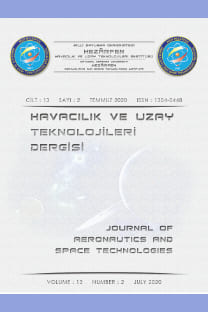Kenar Koruyan Filtreler ve İçsel Görüntü Ayrıştırma ile Gürbüz Hiperspektral Öznitelik Çıkartımı
Robust Hyperspectral Feature Extraction Method Using Edge Preserving Filters and Intrinsic Image Decomposition
___
- [1] P. Ghamisi, N. Yokoya, J. Li, W. Liao, S. Liu, J. Plaza, B. Rasti, and A. Plaza, "Advances in hyperspectral image and signal processing: a comprehensive overview of the state of the art,” IEEE Geosci. Remote Sens. Mag., vol. 5, pp. 37-78, December 2017.
- [2] L. He, J. Li, C. Li, and S. Li, "Recent advances on spectral–spatial hyperspectral image classification: an overview and new guidelines," IEEE Trans. Geosci. Remote Sens., vol. 56, pp. 1579-1597, March 2018.
- [3] M. Dalla Mura, A. Villa, J. A. Benediktsson, J. Chanussot, and L. Bruzzone, "Classification of hyperspectral images by using extended morphological attribute profiles and independent component analysis," IEEE Geosci. Remote Sens. Lett., vol. 8, pp. 542-546, May 2011.
- [4] L. He, J. Li, A. Plaza, and Y. Li, "Discriminative low-rank gabor filtering for spectral–spatial hyperspectral image classification," IEEE Trans. Geosci. Remote Sens., vol. 55, pp. 1381-1395, March 2017.
- [5] H. C. Li., H. L. Zhou, L. Pan, and Q. Du, "Gabor feature-based composite kernel method for hyperspectral image classification," IET Electronics Letters, vol. 54, pp. 628-630, May 2018.
- [6] X. Kang, S. Li, L. Fang, and J. A. Benediktsson, "Intrinsic image decomposition for feature extraction of hyperspectral images," IEEE Trans. Geosci. Remote Sens., vol. 53, pp. 2241-2253, 2015.
- [7] X. Kang, S. Li, and J. A. Benediktsson, "Spectralspatial hyperspectral image classification with edgepreserving filtering," IEEE Trans. Geosci. Remote Sens., vol. 52, pp. 2666-2677, May 2014.
- [8] X. Kang, S. Li, and J. A. Benediktsson, "Feature extraction of hyperspectral images with image fusion and recursive filtering," IEEE Trans. Geosci. Remote Sens., vol. 52, pp. 3742-3752, June 2014.
- [9] X. Kang, X. Xiang, S. Li, and J. A. Benediktsson, "PCA based edge-preserving features for hyperspectral image classification," IEEE Trans. Geosci. Remote Sens., vol. 55, pp. 7140-7151, December 2017.
- [10] F. Melgani, and L. Bruzzone, "Classification of hyperspectral remote sensing images with support vector machines," IEEE Trans. Geosci. Remote Sens., vol. 42, pp. 1778-1790, August 2004.
- [11] J. Bioucas-Dias, and M. Figuerieredo, "Logistic regression via variable splitting and augmented lagrangian tools," Inst. Superior Técnico, Tech. Rep., Lisbon, Portugal, August 2009.
- [12] J. Shen, X. Yang, X. Li, and Y. Jia, "Intrinsic ımage decomposition using optimization and user scribbles," IEEE Trans. Geosci. Remote Sens., vol. 43, pp. 425-436, April 2013.
- [13] S. Bell K. Bala, and N. Snavely, "Intrinsic images in the wild," ACM Transactions on Graphics (SIGGRAPH), vol. 33, pp. 159-180, July 2014.
- [14] E. S. Gastal, and M. M. Oliveria, "Domain transform for edge-aware image and video processing," ACM Transactions on Graphics (ToG), vol. 30, pp. 69-80, July 2011.
- ISSN: 1304-0448
- Yayın Aralığı: 1
- Başlangıç: 2003
- Yayıncı: Dr. Öğr. Üyesi Fatma Kutlu Gündoğdu
Türkiye’nin İlk 1,5 kW Hall Tipi Elektrikli İtki Sistemi Performans Özellikleri
Demet ULUŞEN, Banu ÇİÇEK AYDIN, Yusuf YURTTAŞ, Barış ÇAL, Andrii TSYBULNYK, Sergii NEUGODNIKOV, Oleksii CHERKUN, Seda GÜLLÜ
Yazılım Mimarilerinin Genel-amaçlı olarak Modellenmesi, Analizi, ve Koda Dönüştürülmesi
Serpil Ustebay, Ilkay YELMEN, Metin ZONTUL
Clutter Learning Based LS Method for Buried Target Detection in GPR Images
Numerical Investigation of Propeller - Frame Arm Interaction in Hovering Flight
Aerodynamic Performance Losses due to Ice Formation on the UAV’s Wings
Özcan YIRTICI, Durmuş Sinan KÖRPE, Serkan ÖZGEN
İHA Kanatlarında Buz Oluşumu Kaynaklı Aerodinamik Performans Kayıpları
D. Sinan KÖRPE, Özcan YIRTICI, Serkan ÖZGEN
Customer Segmentation Based on Self-Organizing Maps: A Case Study on Airline Passengers
